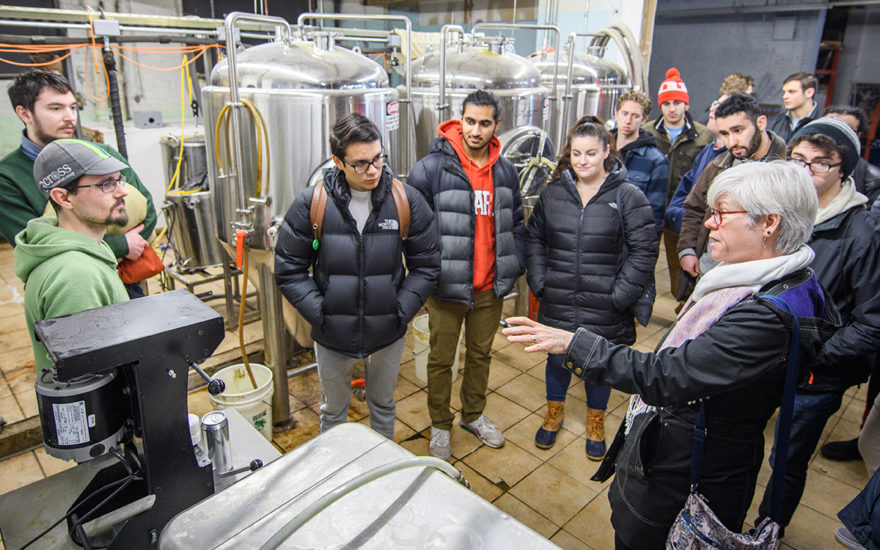If you want to understand the causes and consequences of critical world issues like income inequality and economic development, you have to follow the money. As an economics major, you not only will gain an understanding of how economies work, but also will develop the problem-solving skills needed to address these issues for the betterment of all.


Why study economics at Clark?
- Gain relevant insights through our unusually broad and deep curriculum, with particular strengths in international economics, spatial environmental economics, applied econometrics, and development economics.
- Put your learning into practice through research projects, worldwide internships, study abroad programs, and membership in Clark’s Undergraduate Economics Society.
- Customize your academic program with electives and courses outside the department to align your experience with your personal interests and career or graduate school objectives.
- Apply
- Request Info
Are you ready to take the first step?
Featured Courses

Urban Economics
This course invites you to learn why people around the globe want to live and work in cities, and how markets in housing, location, and education cope with the challenges of urban growth — and sometimes, decline.

The Economics and Policy of Food
Use the lens of applied economics to explore a wide range of issues associated specifically with the U.S. food system, then undertake a research project on the value chain of one Massachusetts-based food product.

Policy Evaluation and Education in Developing Countries
Learn the tools and methods needed to assess the impact of student education policies, and how they’ve been used in the developing world — then write a policy evaluation proposal to solve a real-world problem.
The economics major is designed to give you an understanding of the core theory of economics, frameworks for analyzing issues, how to identify and manipulate relevant data, the basic tools of statistical analysis (statistics and econometrics), and the ways such knowledge and skills can be applied to research and problem-solving.
Courses are available in international trade and finance, economic development, monetary economics and labor, environmental economics, development economics, economic history, and the economics of sport.
Read the Undergraduate Economics Handbook (PDF).
Curriculum update
Effective fall 2025, Clark offers new majors a B.S. in Economics instead of a B.A. Contact your advisor for details.
Eleven courses are required for the major.
At Clark you’ll get more than a great education; you’ll also be prepared for a long, productive career and life of consequence. And once you’ve completed your degree, you can join other Clark alumni who have gone on to work for great organizations and attend some of the best graduate schools in the world. The following communities may be of interest:
Business, Marketing, and Entrepreneurship
Science, Data, and Technology
Qualified juniors and seniors can join the Clark chapter of Omicron Delta Epsilon (ODE), the international economics honor society. ODE offers members a number of benefits, including access to other members from around the world and opportunities to publish original research.
Associate Analyst
Price Waterhouse Coopers
GIS Analyst
Environmental Protection Agency
Senior Strategy Consultant
IBM
Economic Analyst
Eastern Research Group
Superior Court Judge
State Court Judge
The Clark Experience
The Clark Experience brings together the exceptional education you’ll receive in the classroom and so much more. Through focus and flexibility, it ensures you’ll leave Clark with the creativity, confidence, and resilience to succeed and lead a life of meaning and consequence.
Frequently Asked Questions
What can I do with a major in economics?
By emphasizing careful thinking, analysis, and problem-solving, the economics major offers you skills that are highly valued in a number of careers and graduate programs, including banking, insurance, finance, and other business fields; planning and research in environmental and urban studies; international development; graduate study in law, public policy, and business administration; and economics as a profession, including teaching, research, and public policy.
What skills will I learn while studying economics?
- Summarize an argument in the academic literature and interpret statistical results at the level of basic regression analysis
- Identify, collect, and interpret data appropriate to a topic for economic analysis
- Build on existing knowledge to analyze an economic issue or conduct a positive or normative analysis of a policy proposal
- Present ideas in written, oral, or other form
Are there academic achievement award for economics students?
David R. Porter ’35 Prize for Excellence in Economics
The David R. Porter ’35 Prize for Excellence in Economics was established in honor and memory of David R. Porter, a member of the Class of ’35, and Trustee of the University, by his family and friends. The award is given every fall to the outstanding senior majoring in Economics.
Harry B. and Alice N. Sheftel Endowed Prize in Economics
Awarded annually by the Economics department to an outstanding undergraduate student, except in those years when extraordinary scholarship by a graduate student or faculty member deserves recognition.
The Roger Van Tassel Book Prize
The Roger Van Tassel Book Prize is awarded each year to an outstanding freshman or sophomore in elementary economics. The award takes the form of a book such as a biography of an economist or classic work in economics. Professor Van Tassel taught at Clark for 42 years, including 21 years as Department Chair. He had a special passion for introducing undergraduate students to economics and also taught courses in international economics.
Is there an honors program in economics?
During your junior year, you might be accepted into the economics honors program. Joining the program means you’ll work closely with a professor to create a thesis on a topic of your choice. Examples of recent honors thesis topics are:
- Measuring the Gender Wage Gap in Pakistan’s Education Sector
- Will the Integration of Morocco to the African Union have a Positive or Negative Impact on its Economy?
- Does Money Buy Happiness: An Analysis of Income’s Impact on Happiness in the United States from 1974-2016
- The Effect of Socioeconomic Factors on Water Quality throughout the United States
- Institutions of Integration: The Role of Educational Systems in Integrating Foreign-Born Youth
Be a force for change.
Come study at a small research university with a strong liberal arts core.

